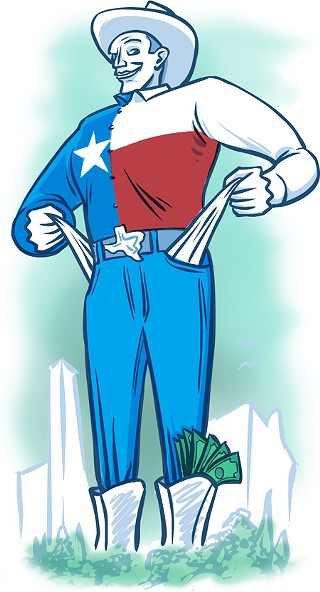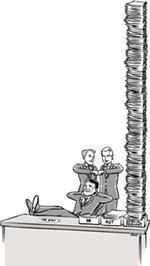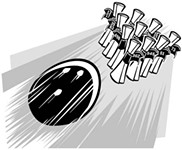Big Tex Budget Blues
The money debate begins: 'Every Texan for himself' vs. 'All in this together'
By Richard Whittaker, Fri., Feb. 6, 2009
In his State of the State address to the Legislature last week, Gov. Rick Perry said once again that he knows how to keep Texas solvent: Double-down on every business-friendly incentive policy, and keep state spending low. But Democratic and Republican legislators actually building the 2010-11 biennial state budget face falling revenues, a tax base overdue for effective reform, rising unemployment, falling health-insurance coverage, crumbling infrastructure, and agencies in urgent need of investment. Even in dire economic times, can Texas afford to be skittish about the state budget?
The Big Picture
While Perry eagerly cited the Fortune 500 companies previously attracted to Texas by low taxes and soft regulation and the 1.2 million new jobs created since 2003, every current indicator reflects that in Texas, as elsewhere, the economic wave has crested. According to the Texas Workforce Commission, the state lost 25,700 nonagricultural jobs in December alone – mostly the type of better-paid blue-collar jobs that came with benefits – and unemployment rose from 5.7% to 6%. The state comptroller's office predicts another 111,000 nonfarm jobs will be lost over the next eight months.
And while demands on state services will inevitably increase, the projected revenue is stagnating. In her biennial revenue review, Comptroller Susan Combs estimated that Texas will receive $91 billion in federal receipts and funds for dedicated spending, plus $76.7 billion from general-revenue-related taxes and fees for a grand total of $167.7 billion. Take out all dedicated funding, and Combs forecasts this leaves the state $77.1 billion for general-purpose spending in 2010-11 – down 10.5% from 2008-09. The situation is bad enough that Lt. Gov. David Dewhurst and House Speaker Joe Straus want to cut 2.5% from the current budget and have asked state agencies to suggest voluntary cuts. Analysts with the progressive Center for Public Policy Priorities (which bases its projections on actual needs rather than simply previous budgets) calculate there is a $5 billion gap between cash and commitments in the current budget. They expect that will swell to $9 billion in 2010-11.
Same Pie, Smaller Pieces
Sen. Steve Ogden, R-Bryan, chaired the Senate Finance Committee last session and delivered its interim report to the new session. With the House still finalizing committee appointments, Senate Finance took the initial lead on budget-building by starting public hearings on Feb. 2. (There's already a disagreement brewing: The Senate wants an extra $200 million for Health and Human Services and $251 million for education, above House proposals, and neither comes close to state agency requests.) "The task is always the same," Ogden said. "We've got to balance the budget and serve the essential needs of Texans. The challenge for us is to listen, and that's what we'll be doing for the next three or four weeks: listening to Texans about the budget that we've introduced and then make changes as appropriate."
The big-ticket items are perennial: Medicaid, insurance, public education, college tuition, and transportation (with prison spending and rhetoric largely a barometer of the economic times). With the economy in free fall, the need for safety-net services will rise. Rep. Dawnna Dukes, D-Austin, has served on the House Appropriations Committee since 2003 and says she was disappointed by the lack of discussion of pocketbook items. "With so many people becoming unemployed," she said, "the thing that they lose is health insurance."
Rep. Donna Howard, D-Austin, said the state needs to be ready to take advantage of promised federal cash. She explained: "If we have more money for the [Children's Health Insurance Program], it's going to require that the states invest matching funds. Many of us are going to be pushing for that."
Education will also be getting more discussion: Ogden says he wants to tackle, once again, the "Robin Hood" system of public-school funding (whereby property-wealthy school districts help subsidize property-poor ones), and Perry wants a college tuition freeze – locking in for four years at the student's freshman rate. Howard is concerned about the details. "There are strings attached to the freeze: You have to keep the same major, and you have to graduate on time," she said, and that timeline is difficult for nontraditional students and certain majors. More importantly, she argues, legislators must take a long-lasting approach to higher-education funding and discuss real investment beyond tuition. She said: "In 2003, [deregulation] was an effort to deal with a budget shortfall. Here we are with another budget shortfall, and we want to freeze tuition fees?" Texas Democratic Party Chairman Boyd Richie's response to Perry's partial freeze was even blunter. He said: "To say, 'My answer is to freeze it at its current level for incoming classes,' that's like saying gasoline is $4 a gallon, [and] we're going [to] freeze it at that price. I still can't afford it."
Even if the state finds a way to relieve family budgets, there are some big reforms it must pay for, such as restructuring the Texas Youth Commission. If it closes current rural facilities, as has been widely advocated, not only will the Lege have to build new ones nearer cities, but there will be pressure to help those communities losing a major employer. Yet after the abuse scandals of 2007, that investment can't wait. Ogden says he wants a similar overhaul of the heavily criticized state school system. "I'm tired of getting beat up for how we treat our mentally retarded citizens," he said.
How to Pay for It
With state revenues essentially static or worse, state agencies are hopeful about the federal stimulus package just passed by the U.S. House and now pending before the Senate. While Ogden said that the national debt that comes with the plan "is scaring me to death," he expects it will be approved early in the state budget process for distribution. Even with that potential injection, all eyes are turning to the state's Economic Stabilization Fund – more colloquially known as "the Rainy Day Fund" – estimated to reach $9.1 billion in the next biennium (largely thanks to that nearly forgotten spike in gasoline prices and therefore oil severance taxes). No one is advocating emptying the coffers, but the question is how deep legislators dare go. "Based on the comptroller's estimates, it looks like we're going to have to tap into that to the tune of $2 billion to $3 billion to be reserved for 'significant one-time expenditures, not recurring items'" – something Ogden thinks possible because "those terms are kind of vague."
Center for Public Policy Priorities senior fiscal analyst Dick Lavine argues that reflexive position fails to acknowledge why legislators started the fund in 1988. "It's supposed to stabilize the budget," he said. "We have a recent publication from [bond-rating house] Standard & Poor's that says that this is what it's for. It does not hurt your bond rating to spend it." Along the same lines, CPPP senior budget analyst Eva DeLuna Castro warns that if Texas wants to keep those Fortune 500 companies that make Perry so proud, that means investment. She explained, "If we lured them here on the promises that they won't have to pay any taxes, then they're still going to want good roads and schools and infrastructure."
But while legislators are under pressure about how much money they spend, they're also under pressure about what money pays for which agency. That means the end of diversions – when a tax supposedly dedicated for one agency helps fund another. But Ogden argued: "That term 'diversion' needs more definition. It's not a diversion to use gasoline-tax revenue for [the Department of Public Safety], because they're as entitled as [the Texas Department of Transportation]. So the question there is not ending a diversion that isn't one – it's can we put more money in highway construction?"
To prevent the budget process from becoming a shell game, legislators are pondering at least some targeted tax increases. There's Senate Bill 217, the plan by Transportation Committee chair Sen. John Carona, R-Dallas, to index-link the state gas tax to highway construction costs. Lavine encourages legislators to stop thinking about revenue projections as immutable prophecy. He said: "People are willing to pay taxes for things they care about, like people in [the Austin Independent School District] voting for a couple of extra pennies for schools. ... For suburbanites, roads to commute on are pretty important." Lavine also argues for fixing tax loopholes to boost revenue. "There's a Sunset Act for all the agencies," he said. "But once a tax break is in the tax code, no one goes back and looks at it." Legislators, he added, need to see if "all those special exemptions and special treatments ... have outlived their usefulness."
Democrats are reflexively quick to defend themselves against allegations that they plan to tax their way out of a deficit. Freshman Rep. Diana Maldonado, D-Round Rock, arrived on an education slate and hopes to bring some lessons from Round Rock Independent School District's innovative approach to college partnerships and dual-credit courses to statewide policy, "so by the time [students] graduate from high school, college is a little more affordable."
From another direction, state Democratic Party Chair Richie argues that big changes can be made by rejecting wasteful and unsuccessful policies driven solely by Republican political dogma, using the opportunity to take another shot at the opening week's political hostilities. "It seems to me," he said, "you could get there by not spending two, three, four days working on Senate rules just so you can get voter ID passed to solve a problem that doesn't exist."
To Lavine, Texans must get past the mentality that a tax dollar that doesn't return directly to their front doors is a wasted dollar. He explained: "It's a consumer orientation: You get what you pay for. But are you on your own, or are we all in this together?"
Got something to say on the subject? Send a letter to the editor.











